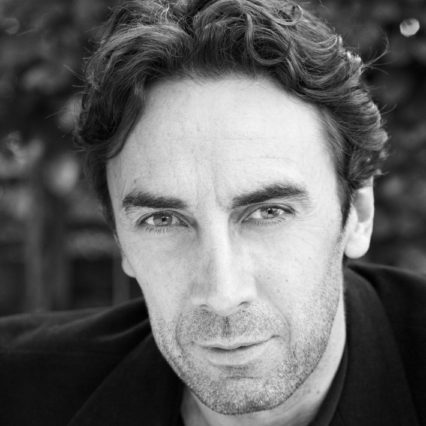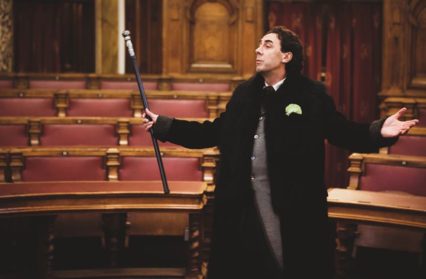Nigel Jarrett is at the Abergavenny Borough Theatre to cast a critical eye over Mappa Mundi and Theatr Mwldan’s production of Merlin Holland and John O’Connor’s The Trials of Oscar Wilde.
Not even choice aphorism could save Oscar Wilde from the rigour of the law and the prejudice of society. First and ill-advisedly, he prosecuted the Marquis of Queensbury for criminal libel and dropped the case; then the Crown prosecuted him for gross indecency, a jury found him guilty after two trials, the first aborted, and he was sentenced to two years’ hard labour. It was a tragedy, as the ironic Wilde might himself have commented. The court transcripts show how in the first hearing, Wilde milks the scenario as if borne aloft on the popularity set up by his stage successes, but in the trials he’s under the cosh; the maxims come less easily and he struggles to win approval.
He would have liked the court to believe that in his love of young men, pre-eminently Lord Alfred Douglas, he was simply behaving like Shakespeare and Michelangelo. That was Oscar’s problem: in his Pateresque, green-carnation world, everything was just so, and ‘immoral thought’ was a contradiction in terms; in the artless one of late Victorian society, it was morally strict and punitive.
Those transcripts turned up in 2000 after being unaccountably lost. Most newspapers of the time reported cases verbatim in sometimes lurid detail, so a play of the sort written from the re-discovered court records by John O’Connor and Wilde’s grandson Merlin Holland could have been conceived in their pages. To be honest, The Trials Of Oscar Wilde is more documentary than drama, despite its more complete and voluminous source material, especially by the standards of modern courtroom theatricals, which at worst are the epitome of ‘telling not showing’. Like them, it resorts here and there to enacted flashback, and in Mappa Mundi’s co-production with Theatr Mwldan it involves the onstage cast of four in doubling that begins to look like the consequence of forced economy.
The almost immediate transformation, for instance, of Robert Bowman’s Queensbury into the barrister Edward Carson QC, and François Pandolfo’s assumption of no fewer than seven roles, including that of the trial judge, begins to resemble a device intended to draw attention to its dexterity. But the authors themselves suggest that the play might be performed with a minimum of three or a maximum of eighteen actors, or anything in between. That said, the casting of Keiron Self as both Wilde’s counsel Edward Clarke QC, and the auctioneer selling off Wilde’s effects is unnecessary: the brief downstage bidding could have been cut without loss, or added to the stint of voiceovers Lynne Seymour and Gwawr Loader, here consigned to the ether in speaking extracts from The Importance of Being Earnest. That the changes soon become an accepted part of Richard Nichols’s direction says a lot for its unimpeded flow and inevitability.

The coup de théatre is the centre-stage depiction of Wilde himself as a character in a play rather than the inspired creator of characters in plays, a role reversal almost guaranteed to make him vulnerable. In Steven Elliott he is almost total simulacrum, from the opening downstage walk-on, in which he’s being cascaded with plaudits, to the final black-out, which finds him alone, vilified, sorrowful, defeated and, to his own satisfaction at least, misunderstood. It might seem easy enough for an actor to play someone who’s become almost a caricature of repartee, but Elliott’s combination of the aloof and the apprehensive, the droll and the sincere, is masterly. The climax of the play, such as it is, lies at the point where under questioning by barrister Charles Gill (Bowman again), Wilde admits that he didn’t kiss a ‘boy’ whose company he was keeping because the boy was ugly, a statement that makes conditional Wilde’s rarefied, almost Platonic, love of young men, the love that proverbially dare not speak its name.
The play is an attempt to show how literary genius was brought down by an intolerant middle class, one reason why this production is given with the support of Stonewall Cymru, the organisation promoting LGBT issues. Yet it’s more complex than that. Wilde thought his talent to amuse could be transferred with ease to the courtroom but the law, such as it was, proved impenetrable, as it always must, until altered.
It is to Elliott’s credit that such complexity is not glossed over. Even allowing for Queensbury’s bluster, Elliott’s performance seems to suggest, and quite rightly, that Wilde was no better than he ought to be, particularly in gifting with silver cigarette cases and champagne dinners a series of young men who certainly were. That they were also of the lower orders and procured for his delectation, as Wilde himself might have put it, suggests not so much that they were being manipulated but that their love was incapable of, or not intended for, reciprocation. In such circumstances, elevated love becomes unadorned lust, and might still be referred to as ‘seedy’. The point, though, is that what Wilde did is no longer illegal. For him, having been found guilty of gross indecency in an atmosphere of cant and hypocrisy, it meant hour after hour walking the jail’s treadmill and picking oakum – not the activities consistent with one who believed in the supremacy of art over morality.
Nichols and his team – MD Peter Knight, designer Carl Davies, and lighting designer Ceri James – each fulfils his tasks with just sufficient input to keep minds focused on what in life was a headlong fall. This applies with interest to Pandolfo’s glittering queue of ne’er-do-wells, which illustrates the machinations of the case against Wilde, not least the dubious element of conspiracy. The echoes we hear of an audience reacting with enthusiasm to a Wilde play were echoes in reality: having served his sentence, the author fled to Paris, where he later died a destitute; but not before leaving us The Ballad of Reading Jail. Steven Elliott’s flamboyant but unguarded Wilde in a production that sticks with the heart of the matter does not appear to be a man who wanted to sign off with a testimony to degradation.
Remaining performances at the Grand Pavilion, Porthcawl on May 24; the Coliseum, Aberdare (May 25); and the Memo, Newbridge (May 27).
Abergavenny Borough Theatre, 17 May, 2017
The Trials of Oscar Wilde, by Merlin Holland and John O’Connor
Nigel Jarrett is a former daily newspaperman and a double prize-winner: the Rhys Davies award and the inaugural Templar Shorts prize, both for short fiction. He is a frequent contributor to Wales Arts Review and a reviewer and columnist for Jazz Journal magazine. This year sees the publication of his latest work of long fiction, Notes From The Superhorse Stable (Saron Publishers) and his fourth story collection, Five Go To Switzerland (Cockatrice Books). In August he will be Author of the Month for the National Library of Wales’s digital libraries project.



 Enjoyed this article? Support our writers directly by buying them a coffee and clicking this link.
Enjoyed this article? Support our writers directly by buying them a coffee and clicking this link.








